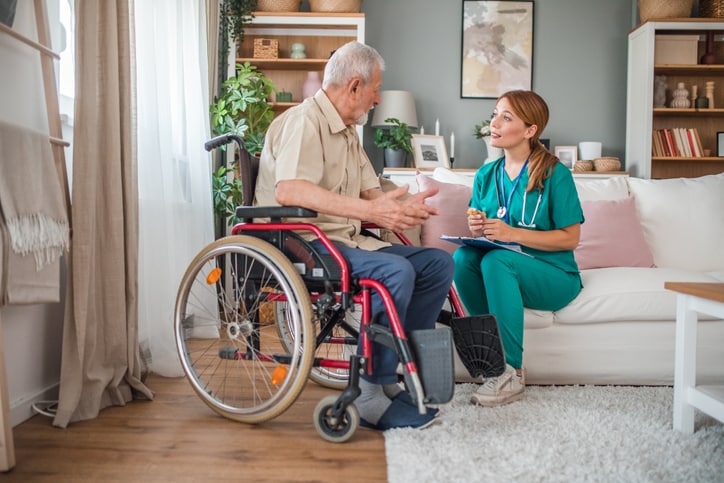Whether you’re an adult who has a surgery scheduled (such as a knee or hip replacement) or you enter the hospital unexpectedly because of a health crisis (such as a stroke or a fall), having a plan for your continuing care once you are discharged is vital to your well-being at every age.
For seniors, in particular, there is a high risk of hospital readmission without proper post-hospital stay care — they may see further functional decline, nutritional issues, mood disorders, cognitive impairment and more, according to Dr. Michele Bellantoni, medical director of Johns Hopkins Bayview Specialty Hospital Programs and associate professor of medicine in the Division of Geriatric Medicine and Gerontology at Johns Hopkins University School of Medicine. And that cognitive impairment (also referred to as delirium) may not clear, and “the individual may not return to their prior level of cognitive functioning and dependence” without proper care, she warns.
With such high stakes, choosing post-hospital stay care can feel daunting, but the experts we spoke to lay out your options below and guide you through making the best choices for you and your loved ones.
In-home care options
When you’re discharged from the hospital, leaning on family and/or friends for support is not the only solution for recovering at home. You also have the option of bringing in home care.
Professional home health care
Private nursing care involves providing “bedside medical care, such as administering medications, managing wounds and tube feedings,” says Dr. Stacie Levine, who specializes in geriatric medicine and palliative care at the University of Chicago Medicine.
These “home health services” may also include physical and occupation therapy, among other services, and may be covered by Medicare on a part-time basis. Bellantoni says these nursing assessments typically take place two or three times a week for an hour or so.
If you require 24/7 care, however, that service is typically paid out of pocket, requiring significant financial resources.
Personal care assistants
Also known as homemakers, nonmedical individuals who function as companions may “assist with activities of daily living, such as cooking, cleaning and transportation,” says Levine. Other services may include bathing, dressing and toileting. They are able to observe the adult taking medication, but they are not allowed to provide medication or other medical services, she adds.
This personal care, as Bellantoni terms it, is not funded by Medicare and is very expensive. She adds that this assistance is “what older adults are lacking in our current healthcare system.”
Assisted living facilities
For those who require support but still want to maintain some independence, an assisted living facility may be the right fit. In order to take advantage of this care option, you have to be independent enough to live in a studio apartment, says Levine. She adds that these facilities may allow short-term stays, but that it would be at the discretion of the facility. Services may include:
- Bathing.
- Medication administration.
- Communal meals.
However, if you “develop advanced dementia and severe functional impairment (e.g., wheelchair or bed bound) [you] may no longer be suitable for that environment,” advises Levine.
Skilled nursing facilities
In general, “adults who are discharged from hospital to skilled nursing facilities are those who have more severe medical conditions or physical decline, and therefore can’t go directly home because of their need for personal care,” says Bellantoni.
The services provided may include some of the following, according to Medicare.gov:
- Meals.
- Skilled nursing care.
- Physical therapy.
- Occupational therapy.
- Speech-language pathology services.
Skilled nursing facilities are covered by Medicare on a short-term basis, if you meet certain conditions.
Rehabilitation centers
There are two types of rehab that you may qualify for, depending on your medical needs and abilities:
- Subacute rehabilitation “is covered under Medicare or Medicare Advantage plans,” says Levine. “It is suitable for a patient who has function decline and needs occupational therapy, physical therapy, speech and language therapy or advanced wound care/IV antibiotics or IV nutrition that cannot be supported within the home.”
An example of someone who qualifies for subacute rehab is a person “who is admitted with an infection or stroke and now has lost muscle mass and is unable to go directly home due to a large degree of weakness or ongoing medical needs that cannot be managed,” explains Levine. You have to be able to endure an hour of therapy per day, and these services are typically located within nursing homes.
- Acute rehabilitation typically takes place “in a rehabilitation hospital,” says Levine, and you “must be able to endure three hours of therapy per day.” Because this can be difficult for older adults, they typically qualify for subacute rehab instead, she adds.
However, if you are able to withstand the three hours of therapy a day, Teri Frykenberg (Dreher), registered nurse, board-certified patient advocate and author of “How to Be a Healthcare Advocate for Yourself and Your Loved Ones,” advises that it can speed and improve your recovery. For example, “If you have a stroke, it’s really important to get into one of these [acute rehab hospitals] quickly because of a principle called ‘neuroplasticity,’” she says. “The faster you can retrain your muscles and your brain to rebuild those pathways, the better you’re going to recover.”
Nursing homes
If you or your loved one has “advanced functional and/or cognitive impairment” and require assistance with “activities of daily living (dressing, toileting, grooming and bathing) and are not likely to improve,” a long-term care setting within a nursing home may be right for you, says Levine.
However, nursing homes may also house subacute rehab programs, as mentioned above.
Palliative care or hospice
Both palliative and hospice facilities provide supportive care for patients with serious illnesses, with hospice care serving those who have a life expectancy of less than six months, says Levine.
- Palliative care may be the right choice if you have a “serious illness that requires ongoing pain and other symptom control (nausea, shortness of breath), but [you] are still interested in aggressive treatment of [the] underlying disease(s),” says Levine. While it is a limited resource in some areas, Levine adds that most hospitals with more than 50 beds will provide some level of palliative care, and in urban and suburban areas there may be home-based and clinic-based care options.
- Hospice care, also known as end-of-life care, “is a holistic service with much more personnel than palliative care (nurses, MDs, social workers, chaplains, volunteers, pet therapists, music therapists, etc).” She adds that if you have had a “difficult hospital stay and wish to refocus [your] attention on maintaining quality of life in the setting of an illness that is not getting better, [you] may opt for hospice care.”
How to plan for post-hospital care
Understand your medical needs and the level of assistance required
“Navigating post-hospital care can be overwhelming, with numerous programs, services and decisions to consider,” says Kara Torrisi, director of nursing home transition and diversion (NHTD) waiver services (NYC & LHV) at Westchester Independent Living Center in White Plains, New York. “The first step is assessing the level of care needed, whether it’s short-term rehabilitation, long-term care or home-based services,” she adds.
You won’t be making this decision in a vacuum, however. Taking your specific needs into account, “the medical team and inpatient therapy services will collectively make a recommendation as to which environment is the safest,” says Levine.
Review your insurance coverage and budget
Some post-hospital stay care options can be prohibitively expensive, if Medicare, Medicaid or private insurance doesn’t cover it. “Unfortunately, in this country, most support for seniors is provided by family caregivers who are largely uncompensated,” says Levine. “The government supports limited access to professional caregivers, and it is state and insurance dependent.”
Therefore, it is important to explore what your private insurance or Medicare/Medicaid covers, as well as take stock of your finances before making decisions about your post-hospital stay care.
Frykenberg also advises looking at the long-term care data from Genworth, which gives national numbers for all different levels of care.
When possible, plan ahead
For many people, being admitted to the hospital is a surprise — they have a heart attack or require emergency surgery, and they and their loved ones don’t have a chance to make a post-hospital plan. However, if that’s not the case — if you have a scheduled hip replacement, for example — there are some things you can do to prepare.
In addition to researching your care options and familiarizing yourself with your finances and insurance coverage, Bellantoni also adds that many medical centers are performing standardized screenings for frailty before elective surgeries. With this screening tool, they can determine early what kind of care will be required after discharge.
And, in some cases, physical therapy (and other health improvement strategies, such as smoking cessation) can be done before surgery, she adds, to improve outcomes.
If you want to recover at home, line up your care plan
The experts we spoke with agree that their “first choice is always to send patients home,” says Levine. And it’s typically what people prefer — to recuperate in a familiar and comfortable place. And if you or your loved one have the resources and the physical ability to do so, it can be a great option.
Additionally, Frykenberg warns that going into a nursing home or another facility for rehab or long-term is not without risks. It can put you at risk for contracting illnesses like COVID and RSV, which can be dangerous for someone with a weakened immune system.
Instead, if your health and finances allow, she recommends lining up home care aides “to come in and be with you for a few days at least to make sure that you’re doing what you need to do.”
A final word on choosing your post-hospital care
Navigating post-hospital care can feel overwhelming, but having a plan and understanding your options can make all the difference in your recovery. From in-home care to skilled nursing facilities or rehabilitation centers, the choice should align with your specific medical needs, financial resources and personal preferences. Without proper care, the risks to recovery — like cognitive decline or hospital readmission — can be significant.
“Planning ahead and consulting with knowledgeable professionals is key to identifying resources like in-home care, transportation and medical equipment that support recovery and independence,” says Torrisi. By working with healthcare providers, exploring local resources and preparing as much as possible before a hospital discharge, you can ensure a smoother transition to recovery for you or your loved one.







